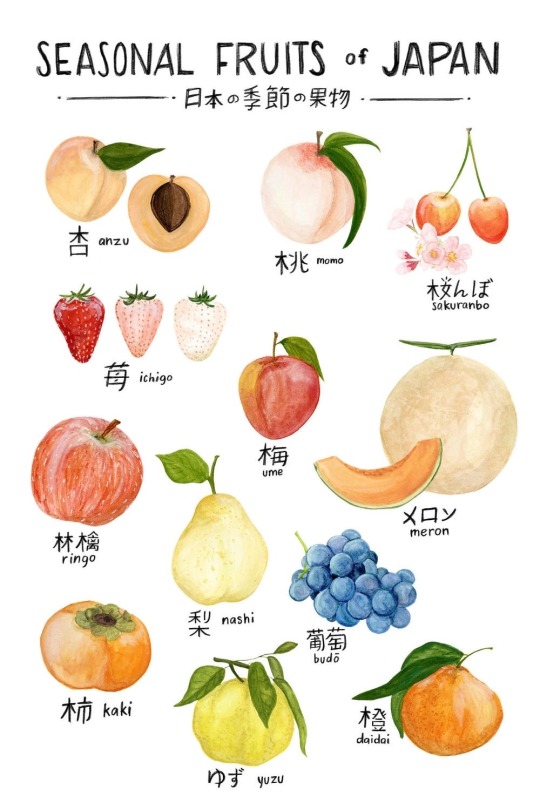ピギーの勉強用アカです twitter: @witchpiggy 翻訳の置くば: yakushite-mita (工事中)
Don't wanna be here? Send us removal request.
Text
Essay Phrases in Japanese
Beginning
初めに はじめに to begin with (first of all)
まず to start with (first of all)
最初に さいしょに first
第一に だいいちに first of all
劈頭第一 へきとうだいいち first and foremost
Continuation
次に つぎに next
更に さらに furthermore
そして and (thus)
そのうえに in addition (furthermore)
また also
並びに ならびに both ~ and ~ (~ as well as ~)
及び および and (as well as)
それだけでなく not only ~ but also ~
のみならず besides (as well as)
しかも however
すでに already
その結果 そのけっか as a result
それにしては considering that
それに対して それにたいして in contrast
ため in order to (because of)
というのは the reason why is
にしたがって following (in accordance with)
にとって for (concerning)
によって due to (because of)
一方で いっぽうで on the one hand
まったく really, truly, entirely
全て すべて overall (in general)
多数の たすうの majority
必ず かならず definitely
急速に きゅうそくに rapidly increasing
ますます increasingly (more and more); decreasingly (less and less with negative)
次第に しだいに gradually (little by little)
現在 げんざい nowadays
確かに たしかに it is true that... but
要すると/要するに ようすると/ようするに in short
非常に ひじょうに extremely
絶対 ぜったい absolutely
誠に まことに absolutely
によると according to
したがって accordingly (therefore)
事実上 じじつじょう actually (as a matter of fact)
だって also
それに加えて それにくわえて in addition to this
Ending
結局 けっきょく after all
最後に さいごに in closing, in conclusion
要約すると ようやくすると in summary
つまり to sum up, in the end
結論は けつろんは in conclusion
結論というと けつろんというと to conclude
このように thus, hence
全体的に ぜんたいてきに overall, on the whole
Phrases from Quizlet by @uni-venture and Talk in Japanese
921 notes
·
View notes
Photo

There’s this theory that in any given language, there are 600 basic words that are really, really good to know, because, you guessed it, they are the most common. Up next: a list of adverbs. Bear in mind that while these are adverbs in English, they aren’t necessarily also adverbs in Japanese! Some are nouns or conjunctions.
here - ここ
there - そこ
above - 上{うえ}に
below - 下{した}に
in front - 前{まえ}に
behind ー 後{うし}ろに
nearby - 手元{てもと}
a long way away - あそこ
inside - 家{いえ}の中{なか}で
outside - 外{そと}で
right (=direction) - 右{みぎ}
left - 左{ひだり}
somewhere - どこか
anywhere - どこまでも
everywhere - どこにも
nowhere - どこにも…ない
Note that you need to use a negative verb for the word to mean “nowhere”
upstairs - 階上{かいじょう}
downstairs - 階下{かいか}
now - 今{いま}
soon - まもなく
immediately - すぐ
quickly - 速い{はや}く
finally - 到頭{とうとう}
again - もう一回{いっかい}
once - 一度{いちど}
for a long time - 前々{まえまえ}から
today - 今日{きょう}
generally - 一般{いっぱん}に
sometimes - 時々{ときどき}
always - いつも
often - しばしば
before - 先{さき}に
after - 〇〇の後{あと}
early - 早{はや}い
late - 遅{おそ}い
never - 決{けっ}して
not yet - まだ
still (=as it has been) - 依然{いぜん}として
already - もう
then (=at that time) - それ
Followed by sentence to refer to event
then (=next) - 次{つ}いで
yesterday - 昨日{きのう}
tomorrow - 明日{あした}
tonight - 今晩{こんばん}
a little - 少{すこ}し
about (=approximately) - ぐらい/くらい
almost - ほとんど
at least - 少{すく}なくても
completely - まるっきり
very - とても
enough - 十分{じゅうぶん}
exactly; just - 丁度{ちょうど}
too much - 〇〇すぎ/〇〇すぎる
more - もっと
less - 未満{みまん}
also - また
especially - とりわけ/特{とく}に
gradually - だんだん
of course - もちろん
only - だけ
otherwise - 又{また}は
perhaps; probably - たぶん
quite - まるで
so; then (=therefore) - したがって/だから
too (=also) - も
unfortunately - 残念{ざんねん}
very much (=really) - 本当{ほんとう}に
well - ろくに
I will be making a Quizlet set with, if not all, then definitely most of the words in this 600 words series, for people to use as a sort of basis to build their vocabulary. Keep an eye out for that!
more like this | my posts | tracking #lookasta | feel free to tag me!
1K notes
·
View notes
Photo


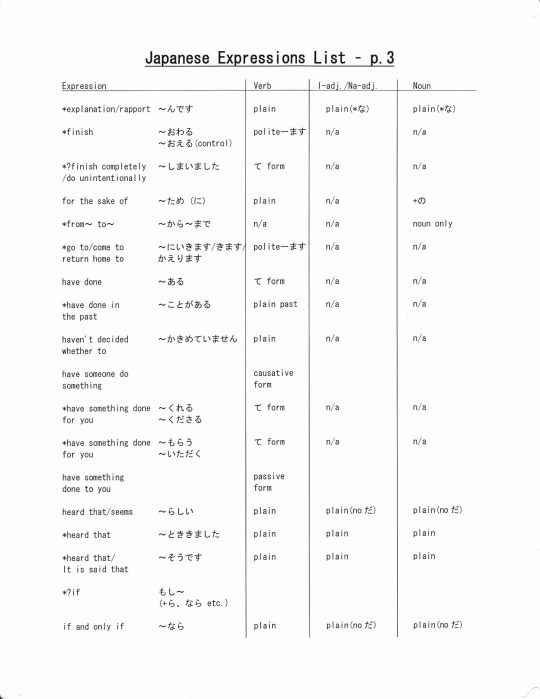
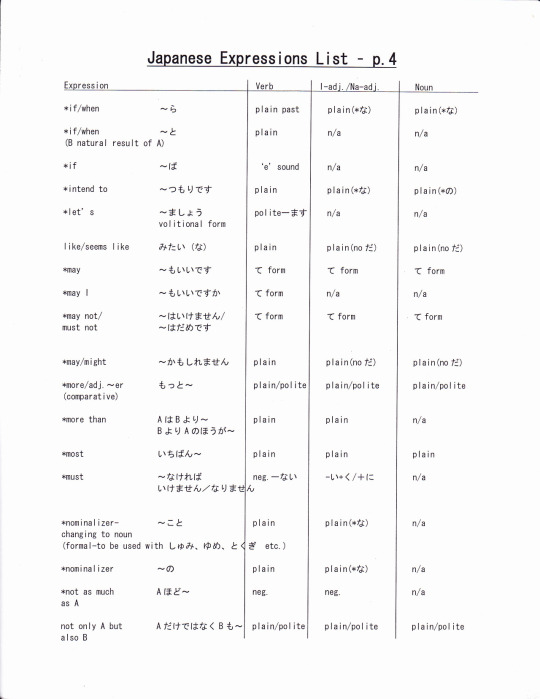

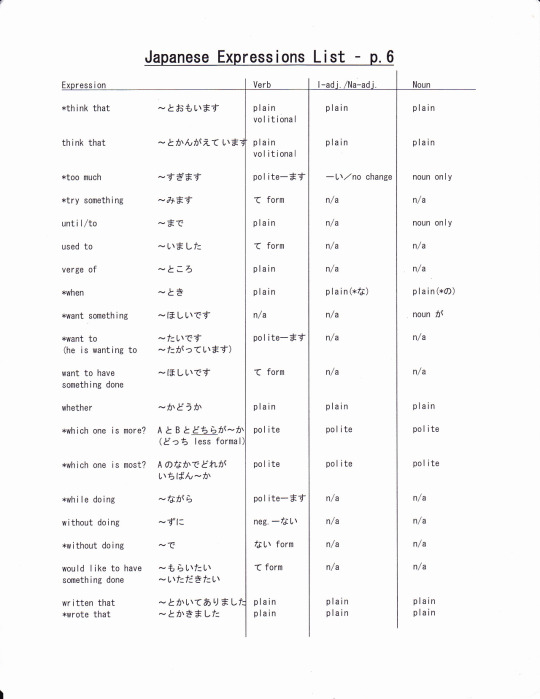
The Japanese grammar packet I promised to hobosensei but really it’s for anyone to use. I hope it’s a helpful start.
3K notes
·
View notes
Text

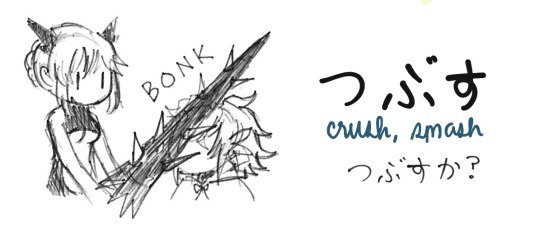
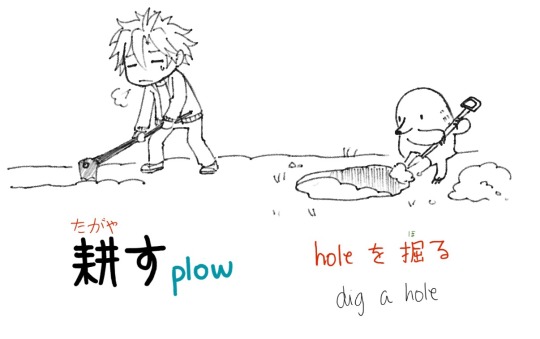
For 2021 I’m starting again the habit of sketching down vocab words and grammar
3 notes
·
View notes
Text
Basic Japanese Conjugations/Adverbs
Here are some pretty useful and simple conjugations and adverbs that 2nd/3rd graders in Japan start to learn!
更に (さらに/sarani) – Furthermore; Again; After All; Moreover
すると (suruto) – Thereupon; Hereupon
然し (しかし/shikashi) – However; But
然も (しかも/shikamo) – Moreover; Furthermore; Nevertheless
然して (そして/soshite) – And; Thus; And now; And finally
その上 (そのうえ/sonoue) – In addition; Furthermore; Above (which)
詰まり (つまり/tsumari) – That is to say; In other words; I mean; In short; In brief; Ultimately; In the end; When all is said and done
所で (ところで/tokorode) – By the way; Incidentally; Even if; No matter (who, what, when, where, why, how)
所が (ところが/tokoroga) – Even so; However; Still; Whereupon; Even though; Nevertheless
其れ共 (それとも/soretomo) – Or; Or else
其れでは (それでは/sorede(w)a) – Well; In that situation…; In which case
其処で (そこで/sokode) – So; Accordingly; Now; Then; Thereupon; Therefore
1K notes
·
View notes
Text
~剤: chemicals in Japanese
※There are literally hundreds of such words, I only picked those I found particularly interesting.
漂白剤 (ひょうはくざい) - bleach
洗浄剤 (せんじょうざい) - detergent
芳香剤 (ほうこうざい) - air freshener; aromatic
接着剤 (せっちゃくざい) - adhesive; glue
除草剤 (じょそうざい) - herbicide
殺虫剤 (さっちゅうざい) - insecticide; pesticide
鎮痛剤 (ちんつうざい) - painkiller; analgesic
潤滑剤 (じゅんかつざい) - lubricant
鎮静剤 (ちんせいざい) - sedative; tranquiliser
清涼剤 (せいりょうざい) - tonic; freshener; cooling agent
研磨剤 (けんまざい) - abrasive; polishing agent
消臭剤 (しょうしゅうざい) - deodorant; air freshener
解毒剤 (げどくざい) - antidote
歯磨剤 (しまざい) - dentifrice; toothpaste
303 notes
·
View notes
Link
List of 188 Japanese particles with meaning / usage
は (wa)Indicantes the topic of a sentence
か (ka)At the end of a sentence indicating a question
が (ga)Indicates the subject of a sentence
に (ni)Indicates a location
の (no)Indicates possession
は (wa)Indicates a contrast between 2 items
に (ni)Indicates time or frequency
へ (e)Indicates direction
を (wo/o)Indicates the direct object of a verb
と (to)Used to connect and list up multiple items
や (ya)Used to connect and partially list up multiple items
など (nado)Used with や (ya) to partially list up multiple items
も (mo)means “too”, “either”, “also”
も (mo)both…and…, neither…nor…
に (ni)Indicates the indirect object of a verb
に (ni)Indicates the surface of a object where some action takes place
で (de)Indicates the location of an action
と (to)Together with
の (no)Indicates an apposition
から (kara)Indicates a starting point in time or place
より (yori)Indicates a starting point in time or place but more formal than kara (20)
まで (made)Indicates a limit on time, space or quantity
くらい (kurai)Indicates an approximate amount
ほど (hodo)Indicates an approximate amount
ばかり(bakari)Indicates an approximate amount
で (de)Indicates a means or material
か (ka)Indicates a choice or alternative
を (wo/o)Indicates a point of departure
を (wo/o)Indicates a route of a movement/motion
に (ni)Indicates a point of arrival
に (ni)Indicates an entering motion
に (ni)Used together with a verb to express a purpose
と (to)Used when quoting someone
と いう (to iu)Indicates the name of something
とか (toka)“something like”
で (de)Indicates a limit or scope
と (to)Indicates a comparison
より (yori)Indicates a comparison
より (yori)Indicates superlative
くらい (kurai)Indicates a comparison
ほど (hodo)Indicates a comparison in a negative sentence
か (ka)someone, something
も (mo)“nothing”, nobody”, nowhere” if used with an interrogative word
に (ni)Used with a verb to indicate a change or choice
をする (wo/o suru)Expresses an occupation or position
でも (demo)Indicates emphasis
でも (demo)Together with an interrogative word it means “anything”, “anyone”, any time”
で (de)Indicates a cause or a reason
から (kara)Indicates a source such as a giver, a cause or material
に (ni)Indicates a person who gives something or who provides a service
は (wa) + が (ga)Indicates the relation between an object / subjects and a verb or adjective
が (ga)Connects two sentences with the meaning “but…���
を (wo/o)Used with an verb expressing emotions, it indicates the cause of this emotion
で (de)Indicates a state / condition of something
で (de)Limits numbers
だけ (dake)Indicates a limit on things or amounts
だけ (dake)Indicates a limit on an action or state
で (de)Indicates the time of completion or expiration of something
でも (demo)Following a noun, means “or something like this”
も (mo)Emphasizes in a positive or negative way
でも (demo)Indicates two or more items as an example of a larger list
ばかり (bakari)Indicates that an item, state or action is a single one
ばかり (bakari)Indicates an action was just completed
ところ (tokoro)Indicates that an action takes place, just took place or is about to take place
が (ga)Indicates the subject of subordinate clause when it is different from the subject of the main clause
から (kara)conjunction meaning “after” or “since”
ながら (nagara)Indicates that an action is happening simultaneously
が (ga)Indicates the subject of a relative clause
の (no)Indicates the subject of a relative clause
から (kara)Used as a conjunction and indicates a cause or reason
ので (node)Indicates a strong reason
の (no)Indicates a modified pronoun
の (no)Used to nominalize verbs & sentences
なら (nara)Used as a conjunction and indicates a supposition or condition
なら (nara)Indicates a topics and is used as an alternative to wa (No.1)
と (to)Indicates a condition that results in an inevitable outcome
ば (ba)Used as a conjunction to express a probable results
ばいい (ba)“all you have to do…”
ば (ba)Used to enumerate two or more actions or states
たら (tara)Used as a conjunction, indicates a supposition or condition
たら (tara)Used as a conjunction to indicate that one action takes place before the action described in the main sentence
ところ (tokoro)Used as a conjunction to indicate a condition that brings about a discovery
ても (temo)a conjunction meaning “even if”
ても (temo)Used with a set of contrasting verbs and adjectives
ても (temo)Together with an interrogative word it means “no matter what/where/who”
ては (tewa)Indicates a condition which will bring a negative conclusion
のみ (nomi)Indicates a limit (similar to だけ dake)
まで (made)“even”, used to emphasize
さえ (sae)“even”, used to emphasize
さえ (sae)“if only” or “as long as”
のに (noni)“although”, “in spite of the fact that”
ながら (nagara)“although”, “though”, “but”
とか (toka)Indicates that a list of two ore more things or actions is not exhaustive
たり (tari)List of two or more actions in no particular sequence
たり (tari)Indicates actions or states that alternate
のに (noni)Indicates a purpose or function
のです (no desu)Asks for an explanation or reason
きり (kiri)Indicates a limit to an amount
きり (kiri)Indicates the last time a certain incident occured
とも (tomo)Used with numbers and counters to mean “both” or “all”
ながら (nagara)Used with numbers and counters to mean “both” or “all”
しか (shika)Used with a negative verb to indicate limits on conditions or quantities meaning “only”
しかない (shika nai)used with a verb meaning “to have no choice but to”
し (shi)Used as a conjunction, indicating two or more actions or states
し (shi)Used as a conjunction indicating a reason
とも (tomo)Indicates inclusion
に (ni)Indicates the one acting or the one acted upon
か (ka)Indicates uncertainty about something
か (ka)Indicates uncertainty about a state or reason
だの (dano) Indicates two or more items or actions of a longer list (similar to toka とか)
だの (dano)Indicates a pair of opposite actions or states
など (nado)“something to the effect”
やら (yara)Indicates two or more items of a longer list
やら (yara)Indicates uncertainty
ても (temo)Indicates an approximate limit with the meaning of “at the most”
とも (tomo)Indicates an approximate maximum or minimum
は (wa)Indicates that a number is the higher or lowest limit
と (to)Emphasizes a number in a negative sentence
など (nado)Indicates examples
くらい (kurai)Expresses an extent of an action or condition similar to ぐらい gurai
ほど (hodo)Indicates the extend of an action or condition
ほど (hodo)“the more… the more…”
だけ (dake)“as… as…”
だけ (dake)“the more… the more…”
と (to)“about to do something”, “trying to do something”
と (to)“even if…”, “whether… or not”
なり (nari)“either…”, “whether…or”
なり (nari)“anything”, “anyone”, “any time”
こそ (koso)Emphasizes the word preceding it
こそ (koso)Emphasizes a reason or a cause
ては (tewa)Expresses repetition of an action
に (ni)Joins two or more nouns to indicate a list of items
に (ni)Connects two or more items to indicate a matching or a contrast
にしては (ni shite wa)Indicates a generally agreed upon standard
にとって (ni totte)Indicates an effect or value of a person or thing
について (ni tsuite)“about”, “concerning” something or someone
とも…とも (tomo… tomo)“can’t say whether… or…”
が (ga)“even if”, “whether… or not”
は (wa)Emphasizes contrasting elements
として (toshite)Indicates status, capacity or function
として (toshite)Provides emphasis in a negative sentence
ばかりでなく(bakari de naku)“not only… but also”
だけ (dake) used to express “not only…but also”
のみ (nomi)used to express “not only…but also”
なり (nari)“as soon as”
146がはやいか (ga hayai ka)“as soon as”
やいなや (ya ina ya)“as soon as”
かないうちに (ka nai uchi ni)“no sooner had”, “hardly had”
ばかり (bakari)Indicates the only action left to do
ばかりに (bakari ni)Emphasizes a reason or cause
すら (sura)Emphasizes in the meaning of “even”
など (nado)Expresses a humble attitude towards an item
とも (tomo)“no matter what”, “even if”
ともあろうひと (tomo aroo hito)To express that someone did something not to be expected
どころか (dokoro ka)“far from”, “not to mention”
だけに (dake ni)Indicates a cause or reason
までもない (made mo nai)“there is no need to…”
ものの (mono no)“but” or “although”
ところで (tokoro de)“even if”
けれども (keredomo)Connects 2 sentences meaning “but” or “although”
けれども (keredomo)Indicates a preliminary remark
が (ga)Used to soften a statement or refusal
けれども (keredomo)Indicates a desire
ね (ne)At the end of a sentence to confirm a statement
ね (ne)At the end of a sentence to soften a request or suggestion
ね (ne)At the end of a sentence to indicate a reason or cause
ねえ (nee)At the end of a sentence to indicate emotion
よ (yo)At the end of a sentence to state a strong conviction
よ (yo)At the end of a sentence to articulate a request or suggestion
かしら (kashira)At the end of a sentence to express uncertainty, a request or a question and mainly used by women
かな (kana)At the end of a sentence to express uncertainty, a request or a question and mainly used by men
な (na)At the end of a sentence and used by men to confirm a statement
な (na)At the end of a sentence to express a prohibition, used by men
なあ (naa)At the end of a sentence to express emotion, used by men
なあ (naa)At the end of a sentence to express a desire
の (no)At the end of a sentence to express a question or soften a command, used by women
わ (wa)At the end of a sentence to soften a statement, used by women
さ (sa)At the end of a sentence to indicate slight emphasis, used by men
こと (koto)At the end of a sentence to indicate emotion, used by women
こと (koto)At the end of a sentence to express a suggestion or invitation, used by women
もの (mono)At the end of a sentence to express a reason or excuse
とも (tomo)At the end of a sentence to express an assertion
ものか (monoka)At the end of a sentence to express a negative determination, used by men
や (ya)At the end of a sentence to soften a statement, request or suggestion, used by men
たら (tara)At the end of a sentence to indicate a suggestion or proposal
やら (yara)At the end of a sentence to indicate a rhetorical question with a negative implication
ぜ (ze)At the end of a sentence to add for to sentence, used by men
ぞ (zo)At the end of a sentence to add force to a sentence or to express a question to oneself
8K notes
·
View notes
Text
Unfamiliar Words/Grammar:
裂傷 (れっしょう) : laceration
貫通する (かんつう) : to pierce/penetrate
特殊 (とくしゅ) : special, unique, peculiar
Senjuushi-R Course 03 (Master)

A Master is one who bears a rose scar in their body; who are able to summon Musketeers. The rose scar is a laceration on the skin resembling a rose, made from the energy of the alinomium crystal piercing the body. The Master has unique abilities such as healing the Musketeer’s wounds and the like.
5 notes
·
View notes
Text
N2復習
These are the grammars I got wrong when going through some of the drills.
A tip for Japanese grammar is to speak and use it to solidify it! But N2 and N1, it gets more difficult because these aren’t as commonly spoken in everyday speaking! So, drilling them with problems works for me.
The parentheses are for the nuance of the grammar.
———————————————————————————————————– N1のウォーミングアップ ____________________
ずじまい- never- Vない形+ずじまい - (never getting the chance to/ended up~) ずにはいられない- can’t help but- Vない形+ずにはいられない (我慢できずに)
にほかならない- none other than- 名(から/ため)+にほかならない (A以外のものではない) つつある- be in the process of doing- Vます形+つつある (Aという変化の途中)
くせに- even though- V普通形/イ形/ナ形な/名の+くせに (Aのに、B) だけのことはあって- no wonder- V普形+だけのことはある (this grammar point has a view variations)
につけ- whenever somethings happens- V辞書形/名+につけ に答えて- in response to- 名+に答えて (Aに合わせて、B)
だけに- as one would expect- V普形/名/イ形/ナ形な+だけに
かと思うと- no sooner than- V普た形+かと思うと
ものなら- if one can do something- V受け身+ものなら
125 notes
·
View notes
Link
Back to the basics: First of all, let us clarify the difference between “conditions” and “conditionals.” We already explained in the previous lesson that conditionals indicate conditions by using main clauses and subordinate clauses, e.g. “if X is true, then Y is true.” By contrast, compound particles for conditions don’t create subordinate clauses, e.g. “X is true depending on Y.” Therefore, although both of them indicate conditions, the structure of sentences is different. Now, let’s check how it works with three types of conditions.
90 notes
·
View notes
Text
Way easier to translate than the first one, but I’m not sure if I nailed the wordking right ^^; STILL I’m surprised how I didn’t need to use the dictionary here. Is this considered progress? (´。• ω •。`)
Senjuushi R Course 02
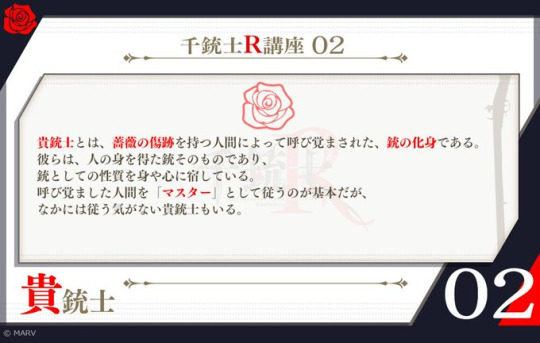
“Noble Musketeers” are incarnation of guns awakened by humans bearing a rose scar.
They are guns that acquire human form; harboring in their body and heart their disposition as a gun .
It is fundamental for them to follow the human who summoned them as their “Master”,
but among them are also Musketeers who have no interest in abiding.
10 notes
·
View notes
Text
Unfamiliar Words/Grammar
薔薇(ばら; rose)
掲げ(かかげ;raise, hold up high)
諸君(しょくん; you (people) gentlemen; ladies and gentlemen; my friends; everyone
病根: (びょうこん; cause of a disease; root of an evil)
主権 (しゅけん; supremacy)
尽きる (つきる; to be used up; to be run out; to be exhausted; to be consumed; to come to an end)
虚栄 (きょえい; vanity, vainglory)
縋る (すがる; 1. to cling to; to hang onto)
面影 (おもかげ;face; looks; vestiges; trace)
偶像 (ぐうぞう;image; idol; statue)
さほど ((not) so; (not) particularly; (not) very; (not) much) NたるN(as a __)
原石 (げんせき; ore, unpolished gem)
見出す (みいだす; to find out; to discover; to notice; to detect) 士官候補生 (しかんこうほせい; military cadet; officer cadet)
くぐる (to go under; to pass under; to go through; to pass through)
Decided to start practicing translation, with a surprise post from the up-and-reviving Senjuushi Rhodoknight. Will attempt translation on some character data and stories later. I’m still studying Nihongo and have no legit translation experience, so if there’s an off translation that needs correcting and better wording translations please don’t hesitate to tell this piggy. This was actually kind of fun to do, but there was so much difficult words/grammar it took me 2 hours to translate _(:3」∠)_
Senjuushi-R Course 01

Raise your rose scars up, Masters. Is it a miraculous blessing, or the root of a curse?
7 years after the World Empire was overthrown. As sovereignty returned to all the countries of the world a certain nation seeks unending glory a certain nation clings on to unseen vaingloryー reaching out to the vestiges of who were once heroes.
Enchanted by the miracle of the red stone, it did not take long for this world to even demand statues of “Noble Musketeers”.
To the sound of a red, sparkling rhodonite, discovering the ore of a knight, Now, a lone military cadet passes through the gate of destiny.
(source)
6 notes
·
View notes
Link
Made a sideblog for translation practice (Vocaloid/game stuff) Unfamiliar words/grammar etc. will be posted here |・ω・)
0 notes



